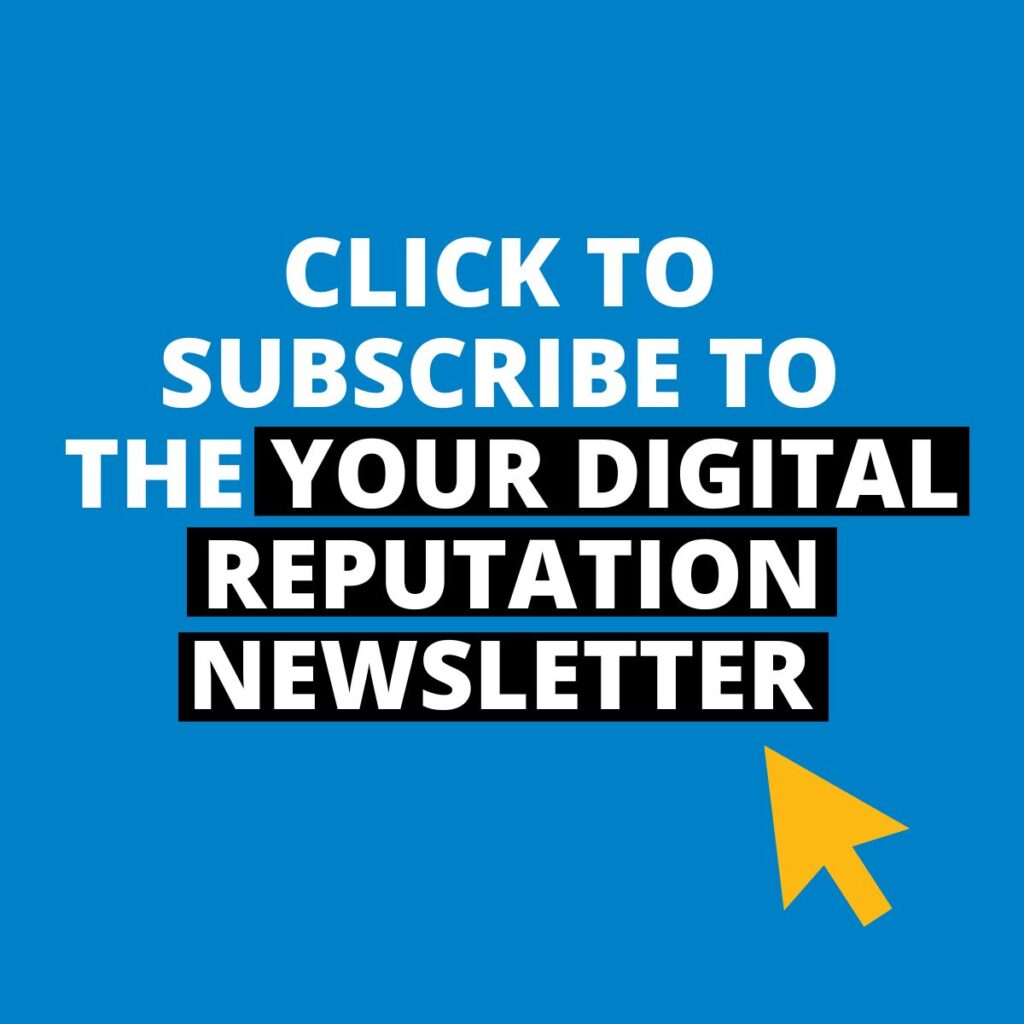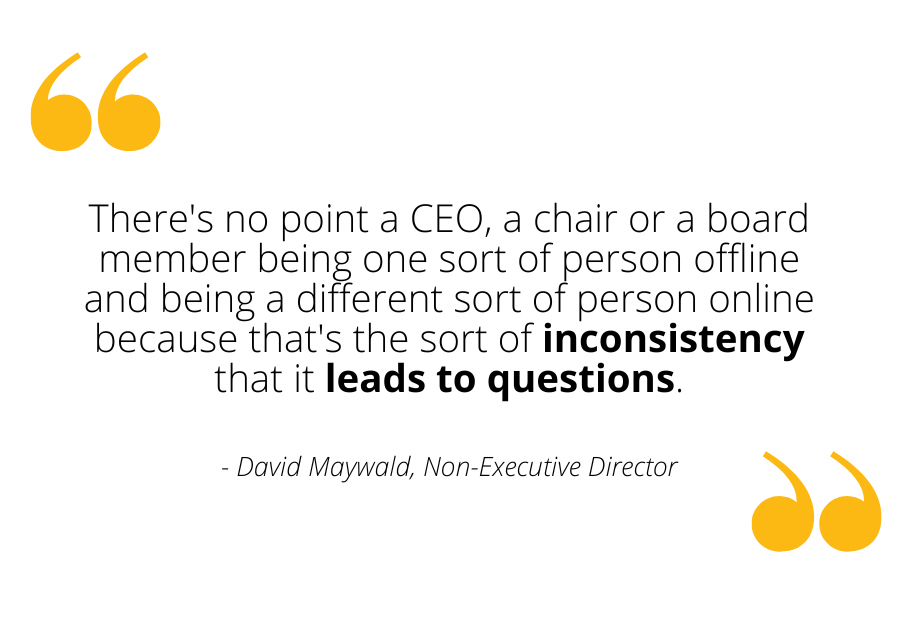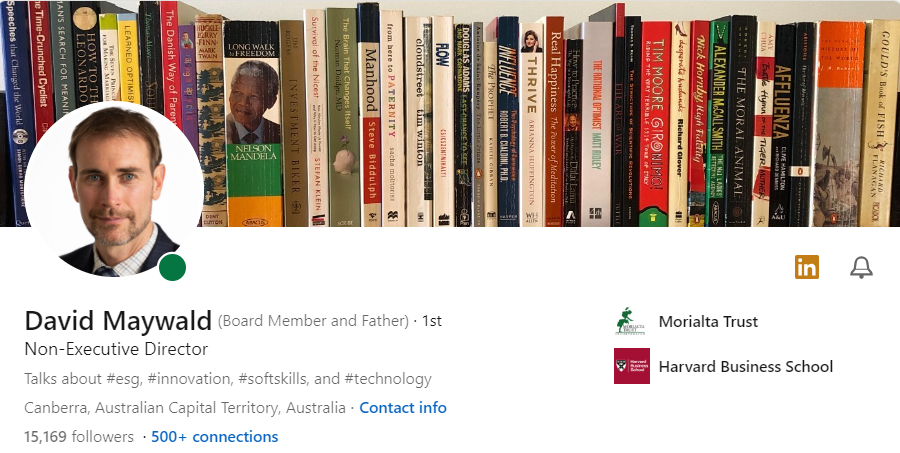In this episode, we’re asking how can board members and their organisations benefit from social media? Now, if you’re a board member and heard the word ‘benefit’, no, that wasn’t a mistake. There truly are some wonderful opportunities for board members online, but I know from experience that it’s a narrative board members very rarely hear – particularly in mainstream media where it’s far easier to find social media stories more closely linked to risk than reward.
So what are the benefits? Why would or should any board member bother? And what do those organisations they’re involved with stand to gain from their efforts online as well? It’s a pleasure to explore this topic with David Maywald, a full-time board member and father of two. David was previously an investment manager for two decades before transitioning to board roles almost five years ago. And he currently serves as a non-executive director of seven organisations across Australia, including the likes of SolarShare Community Energy Ltd and St. John ACT.
Tune in, take a read below and be sure to subscribe to the newsletter so you don’t miss a beat.

Time stamps:
[00:02:17] LinkedIn as an indispensable tool.
[00:06:29] Professional learning and making connections.
[00:08:08] Face-to-face contact augmentation.
[00:12:24] Stakeholder engagement and communication.
[00:16:56] Board members’ views on social media.
[00:23:28] Best practice examples.
[00:30:46] Taking ownership of your digital presence.
[00:32:42] Connecting through LinkedIn for networking.
Roger Christie: David, I should say to right up front, you and I actually met via an Australian Institute of Company Directors webinar for board members not that long ago that I hosted a called, ‘Directors and social media: The cost of staying silent online.’ And it was off the back of that that you and I connected via LinkedIn. It was one of the very first things that you said that struck me and what led to this conversation today. You said you found LinkedIn to be an indispensable tool for both executive and governance roles. Now, given we know plenty of board members and executives think social media platforms like LinkedIn are actually incredibly risky why is your view that it is in fact indispensable?
David Maywald: For me [social mediahas] become a daily application that I make use of to listen and to communicate and engage with some of the most important stakeholders for my roles. Now, if I was going to pitch the use of social media in general for board members and organisations, I’d see the three key aspects of that being.
1. You’re much more able to learn from a wide range of sources and stakeholders and you can form direct channels of communication to funders, clients, staff, executives and other board members.
2. Secondly, it helps with practical tasks. I’ve used LinkedIn, for example, for the recruitment of board members and executives and for helping with fundraising.
3. And then thirdly, it takes proactive ownership of your digital presence. I’m not one for being passive, I’m certainly one for embracing and being an earlier adopter. And it’s crucial to have that ownership, not let other people be writing about your own digital reputation and to really lean in and make the use of the platforms.
Roger Christie: Taking ownership is a really important point and it’s a funny one that’s often not discussed. And I do think that there’s a perception that avoidance is actually safer than participation when it comes to social media. But as you rightly say, if you’re not telling your own story, someone else is and so participation is actually key in that regard.

Roger Christie: … What I’m hearing David is a sense of intentionality to what you’re doing, even in your decisions about what channels and where you do spend your time and where you don’t – there are intentional choices there. But what’s also coming through is this idea that social media isn’t a replacement. It’s not a substitute. Yes, there’s the ability to access information, but really it’s about the people providing it. It’s about networks. It’s about relationships. It’s about finding people who can provide insight and expertise to you that elevates and grows your own career development. Or if it’s a specific issue that you’re dealing with, as you were saying from a governance capacity, you’re now through social media getting access to these networks and these people who you may not otherwise have got to as a way to augment what you’re doing face to face. Would that be a fair assessment?
David Maywald: Absolutely. And you know, this is where I make the pitch to some of the older board members. Some of the directors who are a bit reluctant or have risk aversion or are concerned about sharing and opening themselves up to the sort of publicity or the public exposure of social media platforms. There are risks in not being engaged, and actually you’re missing out on opportunities.
Our relationship wouldn’t have got to this stage if we hadn’t connected through one of the platforms. In fact, I’ve had a whole series of incredible conversations and relationships that have been built on the basis of meeting people electronically. And I think the pandemic forced us into some of those channels, but it’s been a pleasure actually to meet people in real life for the first time post pandemic and getting to conferences with AICD and other organisations where we’ve started to build upon that relationship online and it’s really deepened.
And so if you’re cutting off those opportunities for people to connect with you, then you’ll never know what you’re missing out on.
I think there’s another aspect too. These days there’s a higher expectation on board members, and part of that is being accessible to staff, executive teams, fellow board members, and also whistleblowers. If people can’t connect with you, how can they close that communication loop? How can they reach out to you in a situation where it’s not possible to speak with their manager or with the CEO, because it’s a matter that actually needs to be escalated to a governance level? I’d turn the risk aversion on its head really. Interaction has risks associated with it, but you’re actually missing out on a bunch of opportunities that you’re not even aware of.


